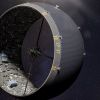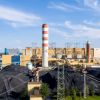-
 +13 +1
+13 +1Manhattan-sized space habitats possible by creating artificial gravity
Massive asteroids could one day be home to future space colonizers. That's because a team of scientists from the University of Rochester published, what they call, a "wildly theoretical paper" outlining how we could one day use asteroids as massive city-sized space habitats.
-
 +4 +1
+4 +1Dimming the Sun to Cool the Planet Is a Desperate Idea, Yet We’re Inching Toward It
The scientists who study solar geoengineering don’t want anyone to try it. But climate inaction is making it more likely. If we decide to “solar geoengineer” the Earth—to spray highly reflective particles of a material, such as sulfur, into the stratosphere in order to deflect sunlight and so cool the planet—it will be the second most expansive project that humans have ever undertaken.
-
 +19 +1
+19 +1Carbon Capture Won’t Work, But It Will Funnel Billions to Corporations
Carbon capture is having a moment, and it’s not hard to see why: As Texas Monthly reports, “the worldwide carbon-capture market is expected to grow from about $2 billion this year to about $7 billion in 2028.” Last year’s bipartisan infrastructure law devotes billions to advancing the technology, and the new Senator Joe Manchin-approved climate compromise bill would do more to bolster the industry.
-
 +19 +1
+19 +1How Fast-Growing Algae Could Enhance Growth of Food Crops
A team including Professor Niall Mangan and researchers from Princeton University used computer modeling to identify the necessary features to support enhanced carbon fixation by an organelle called the pyrenoid, found in green algae, providing a blueprint for engineering this structure into crop plants.
-
 +22 +1
+22 +1Kids Could Soon Have Multiple Biological Parents, Thanks to Gene Editing: Amy Webb
We have grown up having two biological parents. That’s how we know science works. However, things are likely to change in the future, and we will soon have our minds blown. The prospects of gene-editing technology will likely make it possible for the next generations to have more than two biological parents.
-
 +20 +1
+20 +1The world is addicted to natural gas. Fossil fuel companies are lobbying hard to keep it that way
Imagine a world entirely free of fossil fuels. That's no longer such an abstract concept, as most of the everyday things we do can be powered by electricity -- driving a car, heating a home, charging a phone or computer -- and all that energy could come from sources like the wind, the sun and the natural movement of water.
-
 +15 +1
+15 +1Can Bacteria Solve Our Plastic Pollution Problem?
About 360 Million years ago, a toxic material that could not easily be broken down arose on planet Earth. The stuff would persist for thousands of years, amassing on land (and especially in forests) in daunting piles. These mounds stuck around for millions of years, so long that a heap of them fossilized. Today, humans dig up these deposits to burn as fossil fuel.
-
 +26 +1
+26 +1Neal Stephenson on his new geoengineering climate change thriller and coining the term 'metaverse'
Author Neal Stephenson shot to fame almost 30 years ago with the science-fiction novel “Snow Crash,” which envisioned a future dominated by mega-corporations and organized crime, competing for dominance in both the real world and the “metaverse,” a computer-generated world accessible through virtual reality headsets.
-
 +12 +1
+12 +1China to pursue bigger ocean carbon sinks to help meet climate goals
China will explore ways to increase its ocean "carbon sink" and enhance climate resilience in its marine ecological system as part of its pledge to reduce greenhouse gases to net zero by 2060, officials said.
-
 +4 +1
+4 +1'More and more people don't want a traditional burial'
With cremations on the rise, firms now offer such things as turning your ashes into artificial reef formations or human compost.
-
 +15 +1
+15 +1How This CO2 ‘Vacuum Cleaner’ Is Fighting Climate Change
While much of the world took a pause in 2020, climate change did not. And as countries figure out how to reach the goals set in the Paris Agreement, it’s clear that dramatic action—and outside-the-box solutions—are needed to cut emissions. Swiss company Climeworks is working to provide some of those to help reverse climate change with its direct-air-capture technology.
-
 +12 +1
+12 +1Researchers report possible solutions for hard-to-recycle plastics
Millions of tons of plastic end up in landfills every year. It's a big societal problem and an even larger environmental threat. In the United States, less than 9% of plastic waste is recycled. Instead, more than 75% of plastics waste ends up in landfills and up to 16% is burned, a process that releases toxic gases into the atmosphere.
-
 +23 +1
+23 +1Drone Reforestation: The Future of Rebuilding Earth’s Forests with Scalable Technology
To commemorate Earth Day on 22 April, AZoCleantech is taking a closer look at deforestation and exploring drone reforestation technology with real, scalable potential to help Earth recover from the harmful effects of climate change.
-
 +21 +1
+21 +1Want to cut emissions that cause climate change? Tax carbon
Putting a price on producing carbon is the cheapest, most efficient policy change legislators can make to reduce emissions that cause climate change, new research suggests.
-
 +11 +1
+11 +1A Bill Gates Venture Aims To Spray Dust Into The Atmosphere To Block The Sun. What Could Go Wrong?
Microsoft’s MSFT +0.2% billionaire founder Bill Gates is financially backing the development of sun-dimming technology that would potentially reflect sunlight out of Earth’s atmosphere, triggering a global cooling effect. The Stratospheric Controlled Perturbation Experiment (SCoPEx), launched by Harvard University scientists, aims to examine this solution by spraying non-toxic calcium carbonate (CaCO3) dust into the atmosphere — a sun-reflecting aerosol that may offset the effects of global warming.
-
 +21 +1
+21 +1Breakthrough in Turning Straw Into Valuable Biochemicals
Many have dreamed of being able to turn straw into gold like the fabled Rumpelstiltskin. While this may not be possible in the literal sense, scientists are using sunlight to turn straw into something more valuable.
-
 +15 +1
+15 +1Carbon capture 'moonshot' moves closer, as billions of dollars pour in
As the world dices with the climate emergency, businesses and governments are starting to push funding towards technology that aims to trap planet-heating gases rather than let them saturate the atmosphere. Carbon capture is a controversial idea, attacked as a costly distraction from stopping emissions occurring in the first place.
-
 +26 +1
+26 +1There Are So Many Ways Of Capturing Carbon Dioxide: We Must Start Using Them Now
A new study highlights the need for a crash program to develop Carbon Capture and Storage (CCS) technology and to agree on targets for each country, if we are to have any chance of avoiding the worst effects of the climate emergency, which are likely to occur much sooner than expected.
-
 +13 +1
+13 +1CO2 sucked out of the atmosphere can be reused for new chemical processes
Global warming is the biggest challenge we have ever faced. Since the first industrial revolution, the amount of carbon dioxide (CO2) — a powerful greenhouse gas — in the atmosphere has increased by almost 50%, which is causing a steep rise in global temperature. Controlling its increase and keeping temperature rise below 1.5 degrees is necessary to avoid the most catastrophic effects of climate change. However, that likely requires stopping new emissions immediately and reducing the excess CO2 that is already in the atmosphere.
-
 +18 +1
+18 +1The planet has a problem with buildings: Here's how smart ideas, tech and design can change that
Whether it’s a creaky old house or a brand new, state of the art office block, the buildings we live and work in have a big impact on the environment. The challenge to reduce this footprint is sizable. According to a recent report from the Global Alliance for Buildings and Construction, International Energy Agency and the UN Environment Programme, building construction and operations were, globally, responsible for 36% of final energy use in 2018.
Submit a link
Start a discussion




















